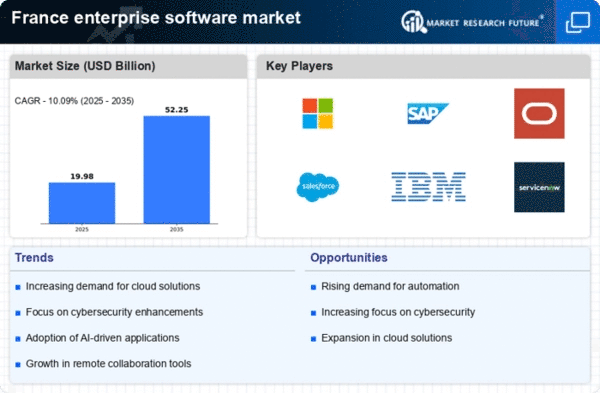Remote Work Enablement
The shift towards remote work arrangements in France is reshaping the enterprise software market. Organizations are increasingly investing in software solutions that facilitate collaboration and communication among distributed teams. Data indicates that around 65% of French companies have adopted remote work policies, leading to a heightened demand for tools that support virtual collaboration. This trend is particularly relevant in sectors such as technology and professional services, where effective communication is crucial for project success. As businesses continue to embrace flexible work models, the enterprise software market is likely to experience growth, driven by the need for innovative solutions that enhance remote work capabilities.
Focus on Data Analytics
The growing emphasis on data analytics in France is a key driver of the enterprise software market. Organizations are recognizing the value of data-driven decision-making and are increasingly investing in software solutions that provide advanced analytics capabilities. Recent statistics suggest that approximately 55% of French enterprises are prioritizing data analytics tools to gain insights into customer behavior and operational performance. This trend is particularly evident in sectors such as retail and finance, where data plays a critical role in shaping strategies. As the demand for actionable insights continues to rise, the enterprise software market is expected to expand, fueled by the need for sophisticated analytics solutions.
Digital Transformation Initiatives
The ongoing digital transformation initiatives across various sectors in France are driving the enterprise software market. Organizations are increasingly adopting software solutions to enhance operational efficiency and improve customer engagement. According to recent data, approximately 70% of French companies have initiated digital transformation projects, which often necessitate the integration of advanced software systems. This trend is particularly evident in industries such as retail and manufacturing, where the need for real-time data analytics and streamlined processes is paramount. As businesses strive to remain competitive, the demand for enterprise software that supports these transformation efforts is likely to grow, indicating a robust market trajectory.
Regulatory Compliance Requirements
In France, stringent regulatory compliance requirements are significantly influencing the enterprise software market. Companies are compelled to adopt software solutions that ensure adherence to various regulations, including data protection laws such as GDPR. The need for compliance management tools has surged, with an estimated 60% of enterprises investing in software to manage compliance risks effectively. This trend is particularly pronounced in sectors like finance and healthcare, where regulatory scrutiny is intense. As organizations seek to mitigate legal risks and enhance transparency, the enterprise software market is expected to expand, driven by the demand for solutions that facilitate compliance.
Integration of Emerging Technologies
The integration of emerging technologies into business operations is significantly impacting the enterprise software market in France. Companies are increasingly looking to incorporate technologies such as IoT, blockchain, and machine learning into their software solutions to enhance functionality and efficiency. Data suggests that around 50% of French enterprises are exploring the adoption of these technologies to drive innovation and improve service delivery. This trend is particularly relevant in sectors like logistics and manufacturing, where operational efficiency is critical. As organizations seek to leverage these technologies, the enterprise software market is likely to witness growth, driven by the demand for integrated solutions that harness the power of emerging technologies.
















